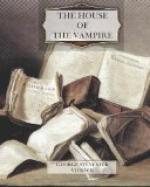“On the contrary,” remarked Reginald, “it would be strange if they were still to know us. In fact, it would be unnatural. The skies above us and the earth underfoot are in perpetual motion. Each atom of our physical nature is vibrating with unimaginable rapidity. Change is identical with life.”
“It sometimes seems,” said the sculptor, “as if thoughts evaporated like water.”
“Why not, under favorable conditions?”
“But where do they go? Surely they cannot perish utterly?”
“Yes, that is the question. Or, rather, it is not a question. Nothing is ever lost in the spiritual universe.”
“But what,” inquired Ernest, “is the particular reason for your reflection?”
“It is this,” the sculptor replied; “I had a striking motive and lost it.”
“Do you remember,” he continued, speaking to Reginald, “the Narcissus I was working on the last time when you called at my studio?”
“Yes; it was a striking thing and impressed me very much, though I cannot recall it at the moment.”
“Well, it was a commission. An eccentric young millionaire had offered me eight thousand dollars for it. I had an absolutely original conception. But I cannot execute it. It’s as if a breeze had carried it away.”
“That is very regrettable.”
“Well, I should say so,” replied the sculptor.
Ernest smiled. For everybody knew of Walkham’s domestic troubles. Having twice figured in the divorce court, he was at present defraying the expenses of three households.
The sculptor had meanwhile seated himself at Reginald’s writing-table, unintentionally scanning a typewritten page that was lying before him. Like all artists, something of a madman and something of a child, he at first glanced over its contents distractedly, then with an interest so intense that he was no longer aware of the impropriety of his action.
“By Jove!” he cried. “What is this?”
“It’s an epic of the French Revolution,” Reginald replied, not without surprise.
“But, man, do you know that I have discovered my motive in it?”
“What do you mean?” asked Ernest, looking first at Reginald and then at Walkham, whose sanity he began to doubt.
“Listen!”
And the sculptor read, trembling with emotion, a long passage whose measured cadence delighted Ernest’s ear, without, however, enlightening his mind as to the purport of Walkham’s cryptic remark.
Reginald said nothing, but the gleam in his eye showed that this time, at least, his interest was alert.
Walkham saw the hopelessness of making clear his meaning without an explanation.
“I forget you haven’t a sculptor’s mind. I am so constituted that, with me, all impressions are immediately translated into the sense of form. I do not hear music; I see it rise with domes and spires, with painted windows and Arabesques. The scent of the rose is to me tangible. I can almost feel it with my hand. So your prose suggested to me, by its rhythmic flow, something which, at first indefinite, crystallised finally into my lost conception of Narcissus.”




